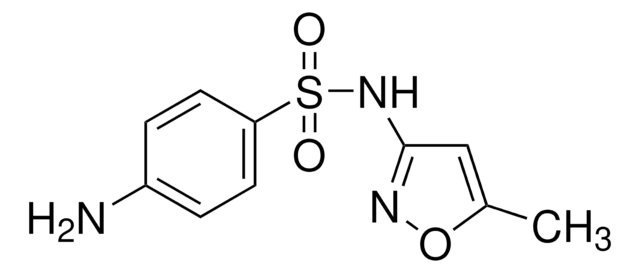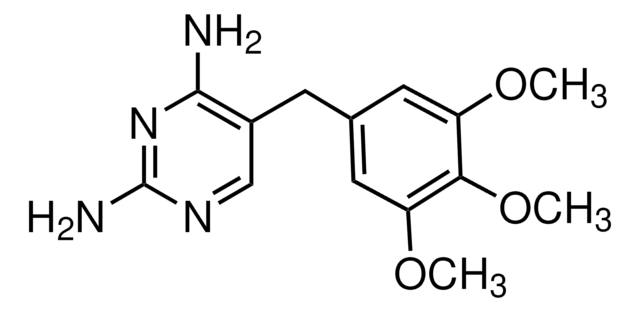T7883
Trimethoprim
≥98.5%
Synonym(s):
2,4-Diamino-5-(3,4,5-trimethoxybenzyl)pyrimidine, NSC 106568
About This Item
Recommended Products
Quality Level
Assay
≥98.5%
form
powder
storage condition
(Keep container tightly closed in a dry and well-ventilated place. Keep in a dry place.)
color
white to light yellow
antibiotic activity spectrum
Gram-negative bacteria
Gram-positive bacteria
mycobacteria
Mode of action
DNA synthesis | interferes
enzyme | inhibits
storage temp.
2-8°C
SMILES string
COc1cc(Cc2cnc(N)nc2N)cc(OC)c1OC
InChI
1S/C14H18N4O3/c1-19-10-5-8(6-11(20-2)12(10)21-3)4-9-7-17-14(16)18-13(9)15/h5-7H,4H2,1-3H3,(H4,15,16,17,18)
InChI key
IEDVJHCEMCRBQM-UHFFFAOYSA-N
Gene Information
human ... DHFRP1(573971) , KCNH1(3756)
rat ... Dhfr(24312)
Looking for similar products? Visit Product Comparison Guide
Related Categories
General description
Application
Biochem/physiol Actions
Packaging
Other Notes
Signal Word
Warning
Hazard Statements
Precautionary Statements
Hazard Classifications
Acute Tox. 4 Oral - Repr. 2
Storage Class Code
11 - Combustible Solids
WGK
WGK 3
Flash Point(F)
Not applicable
Flash Point(C)
Not applicable
Personal Protective Equipment
Certificates of Analysis (COA)
Search for Certificates of Analysis (COA) by entering the products Lot/Batch Number. Lot and Batch Numbers can be found on a product’s label following the words ‘Lot’ or ‘Batch’.
Already Own This Product?
Find documentation for the products that you have recently purchased in the Document Library.
Customers Also Viewed
Articles
This article reviews some of our newest and most innovative technologies and their specific applications toward cancer research. It describes how complex the disease of cancer is, and how difficult it is to identify one topic that is completely unrelated to any other.
This issue of Biofiles reviews some of our newest and most innovative technologies and their specific applications toward cancer research. In preparing this issue of Biofiles, one is reminded how complex the disease of cancer is, and how difficult it is to identify one topic that is completely unrelated to any other.
Our team of scientists has experience in all areas of research including Life Science, Material Science, Chemical Synthesis, Chromatography, Analytical and many others.
Contact Technical Service





